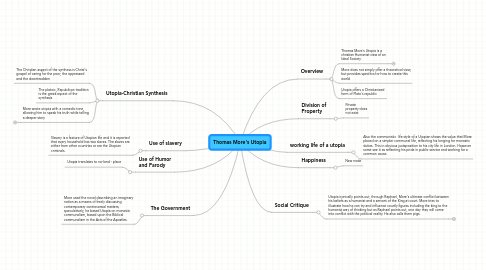Thomas More's Utopia
by andrew sonnabend


1. Utopia-Christian Synthesis
1.1. The Christian aspect of the synthess is Christ's gospel of caring for the poor, the oppressed and the downtrodden
1.2. The platoic, Republican tradition is the greek aspect of the synthesis
1.3. More wrote utopia with a comedic tone, allowing him to speak his truth while telling a deeper story
1.3.1. New node
2. Use of Humor and Parody
2.1. Utopia translates to no-land - place
3. Use of slavery
3.1. Slavery is a feature of Utopian life and it is reported that every household has two slaves. The slaves are either from other countries or are the Utopian criminals.
4. The Government
4.1. More used the novel describing an imaginary nation as a means of freely discussing contemporary controversial matters; speculatively, he based Utopia on monastic communalism, based upon the Biblical communalism in the Acts of the Apostles.
5. Overview
5.1. Thomas More's Utopia is a christian Humanist view of an Ideal Society
5.1.1. New node
5.2. More does not simply offer a theoretical view, but provides specifics for how to create this world
5.3. Utopia offers a Christianized form of Plato's republic
6. Division of Property
6.1. Private property does not exist
7. working life of a utopia
7.1. Also the communistic life style of a Utopian shows the value that More placed on a simpler communal life, reflecting his longing for monastic duties. This in obvious juxtaposition to his city life in London. However some see it as reflecting his pride in public service and working for a common cause.
8. Social Critique
8.1. Utopia ironically points out, through Raphael, More's ultimate conflict between his beliefs as a humanist and a servant of the King at court. More tries to illustrate how he can try and influence courtly figures including the king to the humanist way of thinking but as Raphael points out, one day they will come into conflict with the political reality. He also calls them pigs.
8.1.1. New node
